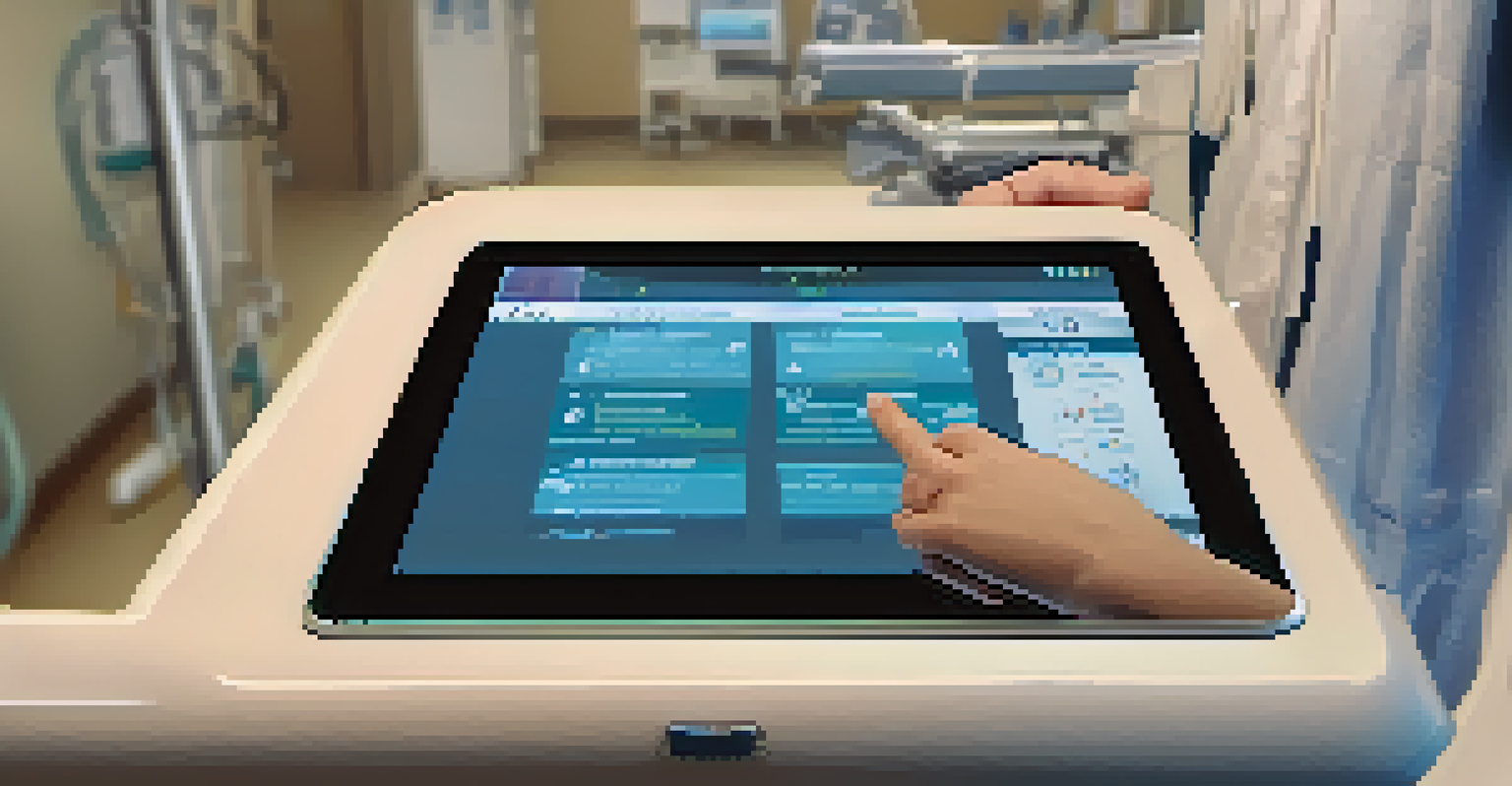The Importance of Multidisciplinary Collaboration in Medicine

Understanding Multidisciplinary Collaboration in Healthcare
Multidisciplinary collaboration in medicine involves various health professionals working together to provide comprehensive care. This approach is essential because no single physician can possess all the knowledge required to treat every aspect of a patient’s condition. By bringing together specialists from different fields, we create a more holistic view of patient health. Think of it as a symphony: each musician plays their part, but together they create a beautiful harmony.
Collaboration allows teachers to capture each other's fund of collective intelligence.
In practice, this means doctors, nurses, pharmacists, and other specialists engage in open communication about a patient’s treatment plan. For example, a patient with diabetes may benefit from input from an endocrinologist, a dietitian, and a mental health professional. This team-oriented approach not only improves care but also enhances patient satisfaction, as individuals feel more supported throughout their treatment journey.
Ultimately, multidisciplinary collaboration fosters an environment where innovative solutions can emerge. When professionals share diverse perspectives, they can identify issues that may have otherwise gone unnoticed. This collaboration is essential in tackling complex medical challenges and ensuring that patient care is both comprehensive and effective.
Benefits of Team-Based Approaches in Patient Care
One of the most significant advantages of multidisciplinary collaboration is enhanced patient outcomes. Studies have shown that teamwork can lead to lower hospital readmission rates, reduced medical errors, and improved recovery times. This is because a team can monitor a patient’s progress more closely and adjust treatment plans as needed, ensuring that no aspect of care is overlooked.

Moreover, patients often feel more empowered when they know their care is managed by a team of experts. This collaborative atmosphere encourages patients to engage actively in their treatment, asking questions and voicing concerns. When patients understand that multiple professionals are invested in their health, they are more likely to adhere to treatment plans and follow medical advice.
Teamwork Enhances Patient Outcomes
Multidisciplinary collaboration leads to improved patient care, with studies showing reduced hospital readmission rates and better recovery times.
In addition to individual patient benefits, team-based approaches can lead to broader improvements in healthcare systems. By streamlining processes and reducing redundancies, multidisciplinary teams can enhance efficiency, ultimately saving time and resources. This efficiency is vital, especially in today’s fast-paced healthcare environment, where every second counts.
Challenges Faced in Multidisciplinary Collaboration
While the benefits are clear, multidisciplinary collaboration does come with its challenges. One major hurdle is communication; professionals from different fields may have varying terminologies and approaches to care. This can lead to misunderstandings or gaps in treatment if not addressed properly. Establishing a common language and mutual respect is crucial to overcoming this barrier.
If everyone is moving forward together, then success takes care of itself.
Another challenge is the potential for conflicting opinions on treatment strategies. When multiple experts weigh in on a patient's care, disagreements can arise, leading to confusion for both the patient and the team. To navigate these situations, it’s essential to foster an environment of open dialogue, where every voice is heard and valued while keeping the patient’s best interests at the forefront.
Lastly, time constraints can also impede effective collaboration. Healthcare professionals often have packed schedules, making it difficult to coordinate meetings or discussions. However, prioritizing collaboration and dedicating time to team meetings can significantly enhance the overall quality of patient care.
The Role of Technology in Facilitating Collaboration
Technology plays a pivotal role in enhancing multidisciplinary collaboration in medicine. Electronic health records (EHRs) allow seamless sharing of patient information among team members, ensuring that everyone is on the same page. This accessibility helps reduce errors and improve the quality of care, as all professionals can quickly access a patient’s medical history and treatment plans.
Telemedicine is another technological advancement that fosters collaboration, especially in rural or underserved areas. Through virtual consultations, specialists can connect with primary care providers and patients without the need for travel. This not only saves time but also allows for a broader range of expertise to be available to patients, regardless of their location.
Technology Facilitates Collaboration
Digital tools like electronic health records and telemedicine enhance communication among healthcare teams, improving the quality of care.
Moreover, collaborative software tools enable real-time communication among team members, making it easier to discuss patient cases and share insights. These platforms can enhance teamwork, ensuring that every professional involved in a patient's care can contribute their expertise, leading to better-informed decisions and improved patient outcomes.
Real-World Examples of Successful Collaboration
There are numerous inspiring examples of successful multidisciplinary collaboration in healthcare. For instance, cancer care often involves a team of oncologists, radiologists, surgeons, and nurses working together to create a comprehensive treatment plan. This coordinated effort ensures that patients receive the best possible care tailored to their specific needs, resulting in higher survival rates and improved quality of life.
Another example can be found in the management of chronic diseases, such as heart failure. A collaborative approach involving cardiologists, dietitians, physical therapists, and social workers can help patients manage their conditions more effectively. By addressing various aspects of the disease—from medication management to lifestyle changes—patients can see significant improvements in their health outcomes.
These examples illustrate that when healthcare professionals come together, they can create innovative solutions that improve patient care. The collective expertise of a diverse team can lead to breakthroughs that single practitioners might not achieve alone, showcasing the transformative power of collaboration in medicine.
Training and Education for Effective Collaboration
To foster effective multidisciplinary collaboration, training and education are essential. Medical programs increasingly emphasize teamwork and communication skills, helping future healthcare professionals understand the importance of working in diverse teams. By incorporating collaborative exercises and simulations, students learn to appreciate different perspectives and approaches to patient care.
Continuing education for current professionals is also vital in promoting collaboration. Workshops, conferences, and professional development opportunities can help healthcare providers enhance their teamwork skills and learn best practices from others in the field. This ongoing education ensures that even seasoned professionals remain adaptable and open to new collaborative strategies.
Training is Key for Effective Teams
Ongoing education and training in teamwork and communication skills are essential for fostering effective multidisciplinary collaboration in healthcare.
Additionally, mentorship programs can play a crucial role in guiding healthcare professionals toward effective collaboration. Experienced practitioners can share their insights and strategies for successful teamwork, helping to create a culture of collaboration within healthcare organizations.
The Future of Multidisciplinary Collaboration in Medicine
As healthcare continues to evolve, the importance of multidisciplinary collaboration will only grow. With increasing patient complexity and the rise of chronic diseases, a team-based approach will be essential in delivering high-quality care. Future healthcare models are likely to prioritize collaboration, integrating specialists, and generalists to better serve patients’ diverse needs.
Moreover, advancements in technology will further enhance collaborative efforts, making it easier for teams to communicate and share information. As telehealth and digital tools become more prevalent, healthcare professionals will have unprecedented access to each other’s expertise, facilitating more efficient decision-making and problem-solving.

Ultimately, fostering a culture of collaboration will lead to better patient outcomes, increased job satisfaction for healthcare professionals, and a more efficient healthcare system. As we look to the future, embracing multidisciplinary collaboration will be key to overcoming the challenges facing modern medicine.